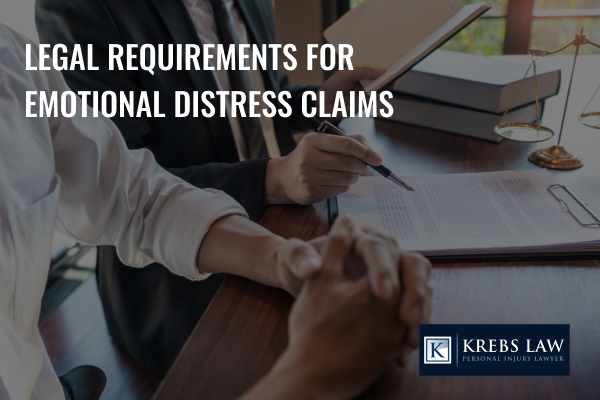
Experiencing a traumatic event can lead not only to physical injuries but also to severe emotional distress. If someone else's actions have caused you major emotional harm, you might wonder if you can sue for that distress.
In law, emotional distress is a legitimate reason for seeking compensation. You can file a lawsuit for emotional trauma if you can prove that someone's actions caused your mental suffering.
Suing for emotional distress isn't straightforward because emotional injuries are harder to identify than physical injuries. This claim requires you to demonstrate how the defendant's behavior affected your emotional state.
Partnering with a compassionate personal injury lawyer can enhance your ability to go through these complexities successfully. At Krebs Law, we can help you address these issues. Emotional distress cases are complicated. Let us fight for you.
An emotional distress claim is a legal action taken when someone suffers psychological harm due to another person's negligent or intentional acts. Depending on the circumstances, this claim can be part of a broader personal injury case or stand on its own.
Emotional distress includes suffering from anxiety, depression, and post-traumatic stress disorder (PTSD). These claims help the affected person receive compensation for their mental anguish. We help you demand compensation for extreme and outrageous conduct.
There are two forms of emotional distress claims. The first is intentional infliction, and the second is negligent infliction. Each type has specific legal criteria that must be met to make a claim. Knowing these criteria is critical for anyone considering this legal route.
Emotional distress claims require substantial proof of the distress and its impact on your life. This often involves detailed personal testimony and expert witnesses.
Intentional infliction of emotional distress transpires when someone behaves in a way that is meant to cause you severe emotional suffering. This behavior must be extreme and outrageous beyond the bounds of decency.
Common examples include threats of physical harm, stalking, or repeated harassment. These actions must lead to your emotional distress and have a severe impact on your daily functioning.
Negligent infliction of emotional distress happens when someone causes you emotional suffering through careless actions. Unlike intentional infliction, the person doesn't aim to cause distress but does so through negligence.
For instance, causing a car accident while texting and driving leads to emotional trauma for the other driver. Proving negligent infliction involves demonstrating that the person had a duty of care they did not uphold. This must have led to your emotional distress.

To pursue an emotional distress claim, certain legal requirements must be met. These vary depending on whether the distress was caused intentionally or through negligence.
To prove intentional infliction of emotional distress, you need to show that the defendant's conduct was extreme and outrageous. This conduct must be so atrocious that it goes beyond all possible bounds of decency.
Furthermore, the defendant must have intended to cause distress or have known that such distress was likely to occur. The resulting emotional distress must also be severe, affecting your mental health. This could even include witnessing a wrongful death.
You must prove that the defendant owed you a duty of care for negligent infliction of emotional distress. You need to show that they breached that duty through negligence and that this breach caused your emotional distress.
It is important to prove that a reasonable person under the same circumstances would have experienced similar distress. This type of claim often accompanies physical injury claims but can stand alone if the emotional impact is considerable.
Collecting and presenting the right evidence is critical in emotional distress claims. This evidence must connect the defendant's conduct with your emotional suffering.
Documenting your emotional and psychological harm involves detailed records. We can help you get them from your therapist or counselor. Keeping a journal of your daily emotional state and how it affects your life can also be helpful. This personal account can provide a timeline that illustrates the extent of your suffering.
Expert testimony from mental health professionals can strengthen your claim. These experts can explain the nature of your emotional distress and its likely causes to the court. Their professional assessment provides the scientific backing to substantiate your claims.

Calculating damages in an emotional distress claim is challenging. It involves assessing the depth and duration of your suffering. It is about the immediate effects and how your life may be altered in the long run.
Filing an emotional distress claim involves several detailed steps, which ensure that all aspects of the case are properly handled.
Litigating emotional distress claims presents unique challenges. These come from the subjective nature of emotional and psychological harm.
Proving the extent of emotional harm requires substantial evidence. Emotional injuries are not as obvious as physical ones. You must demonstrate that emotional distress occurred and how deeply it affected your life. This often involves detailed testimony and documentation.
Emotional distress claims can sometimes be met with skepticism by juries and judges. Overcoming this skepticism requires clear, consistent, and compelling evidence. We can help you show the distress and its impact. An experienced personal injury lawyer is pivotal in presenting your case credibly and convincingly.


If you believe you have suffered severe emotional distress due to someone else's actions, don't hesitate to reach out for legal help.
Contact Krebs Law today for a free consultation to discuss your emotional distress claim. Proving emotional distress is challenging, but we can help you build a strong emotional distress case.
Schedule your free consultation now. Our skilled personal injury lawyer is ready to fight for your rights. We can help you demand the compensation you're entitled to. Let us help you succeed over this challenging time with confidence and support.
"*" indicates required fields